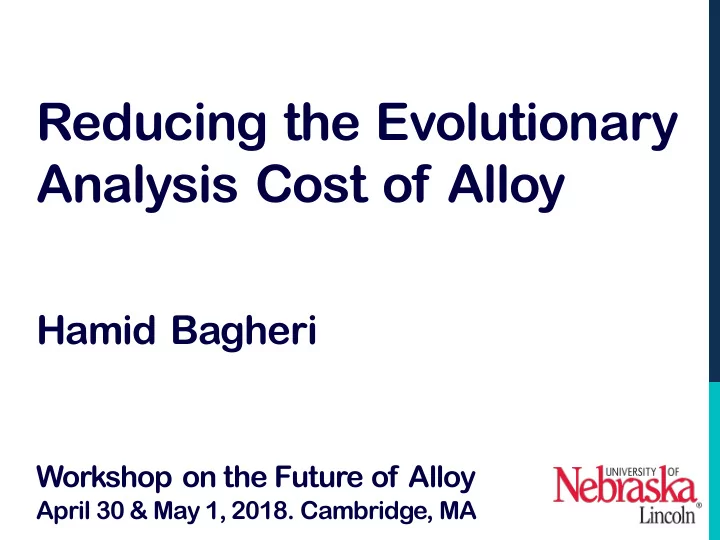

Reducing the Evolutionary Analysis Cost of Alloy Hamid Bagheri Workshop on the Future of Alloy April 30 & May 1, 2018. Cambridge, MA
Alloy’s widespread applications Program verification Design modeling and analysis PO POL Mo MonA nArch Test-case generation Security analysis Po Poirot TestEra
Challenges No support for analysis of evolving specifications • even if they are substantially overlapping Recompute results in each analysis • Especially problematic in online analyses where • specifications are kept in sync with running systems
Objective Improve bounded analysis of evolving specifications 3
Envision • Bound adjustment • Constraint reduction & solution reuse • Parallelization
Bound adjustment Each change by itself is not likely to invalidate all the prior analysis results
Insights Each change by itself is not likely to invalidate all the prior analysis results Results from previous analyses can be used to narrow the exploration space of the revised specification
A sample Alloy specification sig FSObject {} sig Dir extends FSObject {contents: set FSObject} sig File extends FSObject {} one sig Root extends Dir {} fact hierarchy { no contents.Root all obj: FSObject | lone contents.obj FSObject in Root.*contents File + Dir = FSObject } run model {} for 4
A sample Alloy specification sig FSObject {} sig Dir extends FSObject {contents: set FSObject} sig File extends FSObject {} one sig Root extends Dir {} fact hierarchy { no contents.Root all obj: FSObject | lone contents.obj FSObject in Root.*contents File + Dir = FSObject } run model {} for 4
A sample Alloy specification sig FSObject {} sig Dir extends FSObject {contents: set FSObject} sig File extends FSObject {} one sig Root extends Dir {} fact hierarchy { no contents.Root all obj: FSObject | lone contents.obj FSObject in Root.*contents File + Dir = FSObject } run model {} for 4
Relational variables and bounds Upper Bound: All possible values that can be assigned to the relation
Relational variables and bounds Lower Bound: The set of values that a relation should contain in all solutions
Relational variables and bounds Exploration Space
Solutions within relational bounds Upper/lower bound Model instance
Change in the relational specification R5’ R4’
Tighten bounds on relational variables
Tighten bounds on relational variables Adjusted upper bound: union of values assigned to a relation in all solutions
Tighten bounds on relational variables Adjusted lower bound: intersection of values assigned to a relation in all solutions
Tighten bounds on relational variables Adjusted bounds reduce the exploration space
Constraint reduction & solution reuse • Constraints recur during evolutionary analyses • Incrementally store the constraints already solved, and retrieved them within the evolutionary analysis • Prior work: memoization-based approaches in symbolic execution
Thank you
Recommend
More recommend